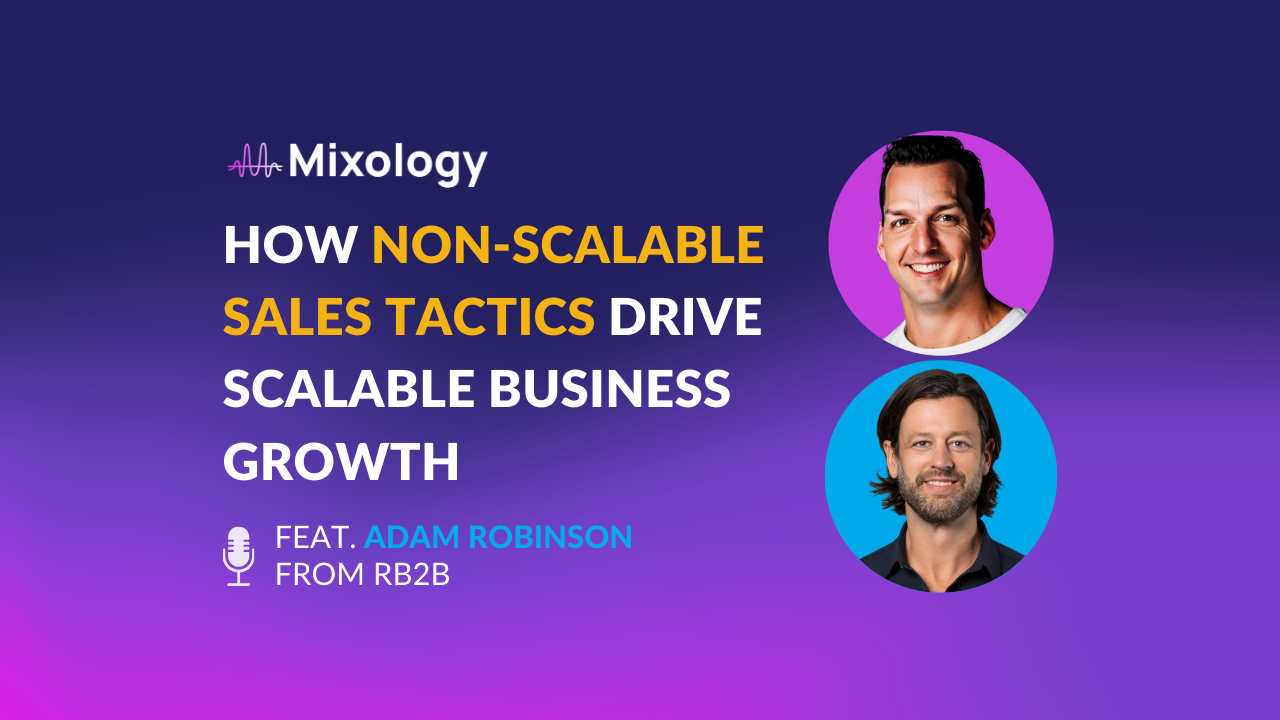When most leaders think about scaling a business, they often overlook the power of manual, personalized sales tactics. Instead, they often focus on automation and growth hacks.
But in this episode of Mixology, Adam Robinson, Founder of RB2B, joins Mixmax’s VP of Revenue, Heath Barnett, to explore the power of manual, personalized sales tactics.
Together, they discuss how taking a hands-on approach, even when it’s not scalable, can build strong customer relationships and lay a solid foundation for growth.
Here’s a breakdown of why early-stage, non-scalable sales tactics are essential, especially for founders and sales leaders.
But first...
What are non-scalable sales tactics?
Non-scalable sales tactics don’t lend themselves to easy replication or automation. Instead, they involve high-touch, manual efforts that allow you to connect deeply with potential customers, gather detailed feedback, and iterate on your product with their needs at the forefront.
Adam’s approach underscores the importance of one-on-one connections to refine product-market fit, ensuring that a product truly serves the people it’s meant for.
| “The only way to achieve word of mouth or product-market fit is to do unbelievably, incredibly manual things,” Adam shared during the interview. |
The idea here is simple: get as close to the customer as possible, learn from them, and allow that feedback to shape the product, messaging, and overall experience.
Why non-scalable sales tactics matter for product-market fit
In Adam’s view, early-stage growth is about honing in on sales tactics that create product-market fit. This starts with getting to know customers deeply through hands-on engagement.
Key insights:
- Conduct real conversations: Robinson and his team did over 300 discovery calls to refine RB2B’s ideal customer profile (ICP).
- Adapt quickly: Regularly update your approach based on customer feedback, ensuring that your product and messaging are aligned.
- Establish a feedback loop: Consistent communication between sales, product, and marketing ensures a unified message and a seamless customer experience.
| According to Adam, “If you have incredibly strong word of mouth, everything you do will work. Without it, nothing you do will work.” |
Non-scalable sales tactics in action: three stories
Adam shared three examples of non-scalable sales tactics from founders who used manual methods to build successful businesses:
- BarkBox: Before launching BarkBox, founder Matt Meeker went directly to potential customers—large dog owners in a New York City park. With only a Photoshop mock-up of the website, he personally asked people if they’d pay for a monthly subscription of dog toys made for larger dogs. By securing pre-orders on the spot, he validated his concept and demonstrated product-market fit before even launching.
- Jasper AI: Jasper’s founder, Dave Rogenmoser, targeted influential figures in the affiliate marketing space. By personally reaching out and manually onboarding them, he created a ripple effect in a small niche, making Jasper a recognized tool that eventually scaled through word-of-mouth.
- ConvertKit: ConvertKit founder Nathan Barry handpicked top food bloggers and tailored his pitch based on their frustrations with Mailchimp. This approach helped him attract a loyal customer base, and soon other food bloggers followed suit, resulting in significant organic growth.
Each of these founders validated their ideas and grew their early customer base through hands-on, non-scalable efforts that paved the way for broader, automated growth later on.
(You can listen to their stories in the full Mixology episode listed at the beginning ⬆️ of this blog post.)
Recognizing when to scale sales tactics
While non-scalable sales tactics are invaluable at the beginning, they aren’t meant to be permanent. Adam shared several indicators that it might be time to transition to more scalable sales strategies:
- Team overload: If your team is stretched too thin managing one-on-one interactions, it may be time to introduce processes or tools to streamline efforts.
- Clear ICP understanding: Once you’ve developed a deep understanding of your ICP and validated your product, you can begin to build repeatable processes around this knowledge.
- Growing demand: When word-of-mouth and organic demand start driving inbound leads consistently, scalable tactics will allow you to capitalize on this momentum without sacrificing quality.
Practical tips to apply non-scalable sales tactics
For those looking to try non-scalable sales tactics, here’s what you can do:
- Get personal: Start by reaching out directly to potential customers. Ask open-ended questions to understand their pain points, and focus on listening rather than pitching.
- Use feedback as your guide: Don’t be afraid to make changes based on what you hear. Use customer input to iterate on your product and messaging.
- Build a feedback loop: Engage regularly with your sales, product, and marketing teams to ensure everyone is aligned. This communication helps create a consistent experience for customers and allows all departments to benefit from each other’s insights.
| “If you know your ICP, you can solve that problem. If not, you might be trying to fit a square peg in a round hole,” Heath emphasized. |
Lessons for sales leaders: making non-scalable sales tactics work for you
Non-scalable tactics may feel counterintuitive in a world of rapid automation, but they’re invaluable for early-stage growth. Here’s how sales leaders can apply these principles effectively:
- Emphasize customer relationships: Make time for customer conversations, even if it feels labor-intensive. These connections will reveal insights that can shape everything from sales to product development.
- Focus on the feedback loop: Establishing a structured way to collect and share feedback across teams ensures that everyone is aligned with customer expectations.
- Create a culture of learning: Encourage team members to share findings from customer interactions and use them to continuously refine your ICP, messaging, and product.
By building meaningful, direct connections with customers, leaders can transform insights from these early interactions into scalable solutions down the line.
Adam’s perspective is a reminder that sales tactics don’t always have to be flashy or automated to work. Sometimes, the most effective strategies are the simplest—connecting with people, listening carefully, and building products that genuinely address their needs.
Final thoughts
While automation and scaling are powerful tools, they often fall short in the earliest stages of growth.
Adam Robinson’s experience shows that non-scalable sales tactics can be the foundation of long-term success. So if you’re a founder or sales leader, consider trading the growth hacks for a little hands-on effort.
| As Adam said, “The role of the early-stage founder is to do things that do not scale.” |
These early interactions aren’t just about closing deals—they’re about understanding your customers, building trust, and ultimately laying the groundwork for growth that lasts.





